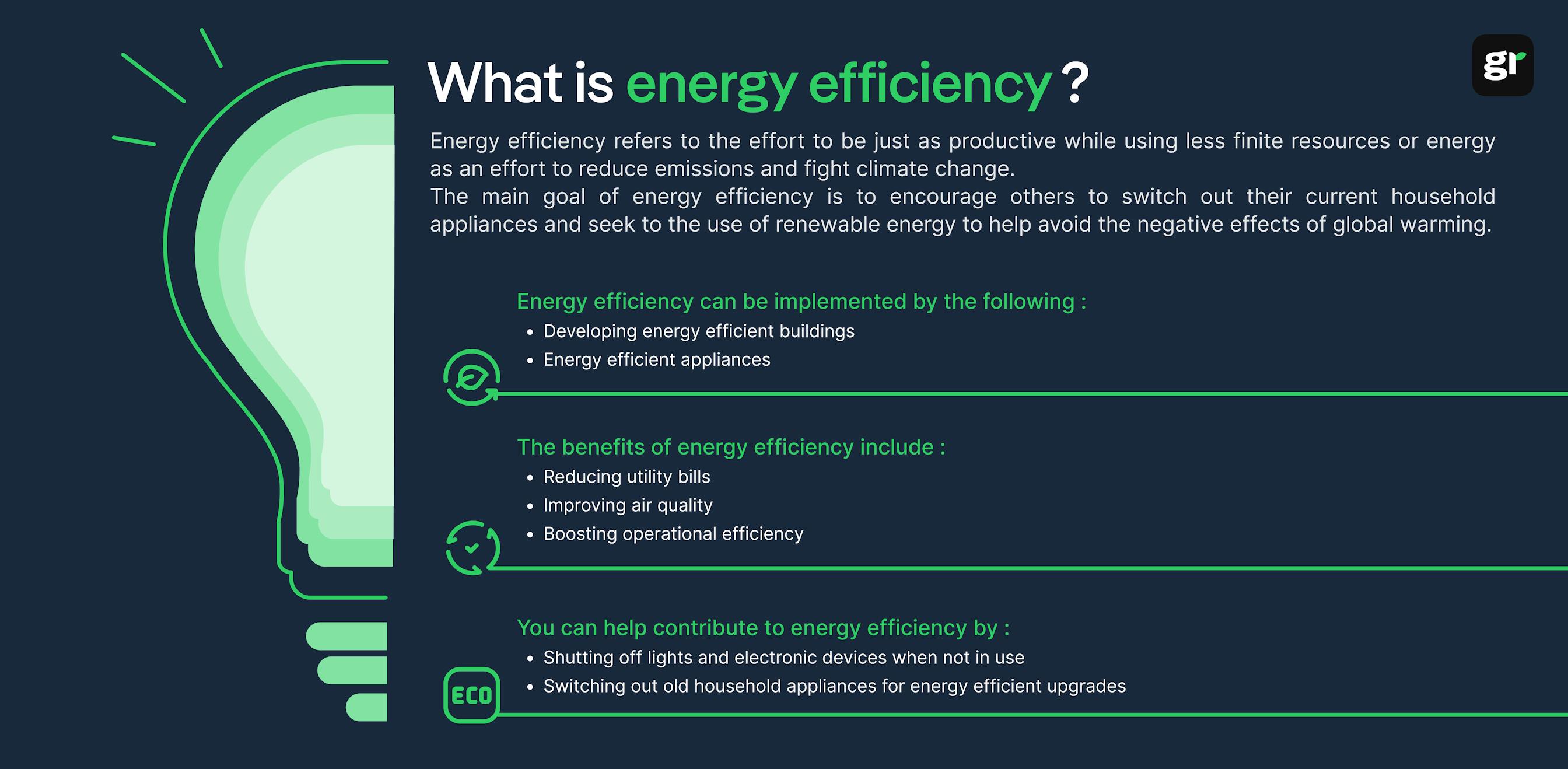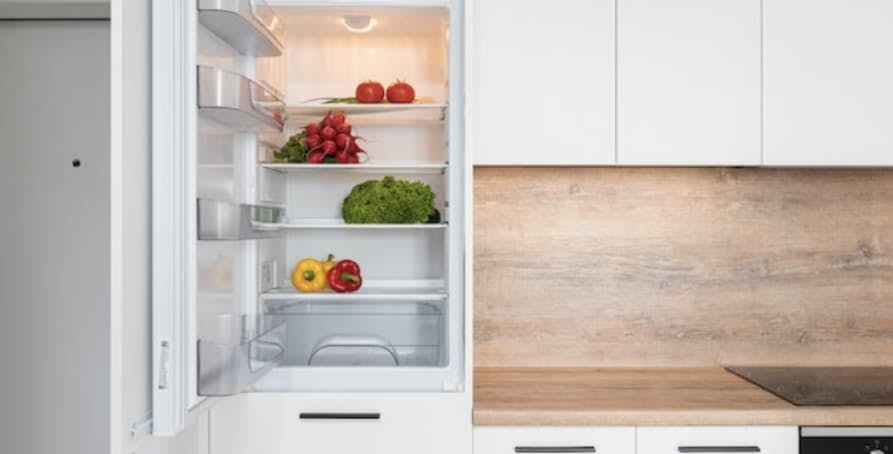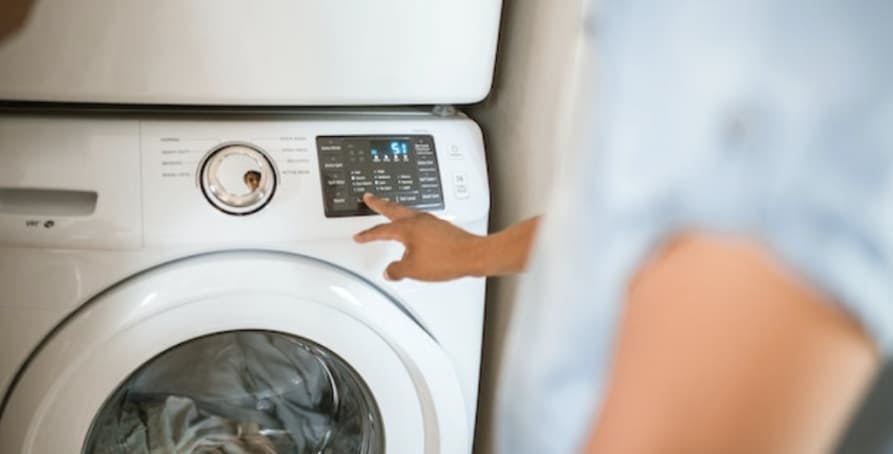
What are the 3 Pillars of Corporate Sustainability?
In this article, we'll explore what the 3 pillars of corporate responsibility are, why they're important, and how businesses can turn them into practical action.
ESG / CSR
Industries



The extensive heat waves of this past summer and new climate bills that have been approved depict how climate change is more of a threat than ever before, resulting in more and more people attempting to alter their daily habits to coincide with sustainability – such as energy efficiency.
Does investing in energy efficient machinery help to reduce emissions, and ultimately aid in the fight against climate change?
In this article, we'll explain what energy efficiency is, why it is important, the benefits of energy efficiency, and how your company can get started to improve energy efficiency.
Energy efficiency means to accomplish the same initial task with less energy than used before. In other words, energy efficiency is all about making do with less.
Energy efficiency measures strives to do the same thing, but instead of saving soup – you're reducing energy consumption all while looking to save energy, save money.
Some examples of energy efficiency projects include:
💡 Energy efficiency projects will often seek to use renewable energy sources, reduce energy costs or energy bills, and improve all energy management systems whilst working towards net zero.


The demand for energy is increasing around the world. Energy prices are rising exponentially, and the demand for energy is beginning to outweigh the available supply – which is eliciting businesses and households alike to take new efforts in saving energy, improve their energy performance, and reducing their greenhouse gases.
💡 This increase in energy demand is unsustainable and not good for emissions or the environment, as many companies will ignore the opportunity for renewable energy sources and seek to use fossil fuels instead – which create greenhouse gasses that pollute the planet.
👉 Ultimately, energy saving and energy efficiency can help to benefit low income households, social housing, adding insulation to homes and help the Energy Saving Trust UK government program or the State Energy Program in the U.S. to meet their energy reduction goals and reduce overall emissions.
There are a multitude of benefits to choosing energy efficient household appliances, energy efficient products, or anything that promotes energy efficiency and helps a clean energy future – such as by working to help existing buildings be more energy efficient, cut back on air pollution, and work towards net zero emissions.
The immediate benefits of implementing energy efficiency are reducing your electricity consumption and saving money by lowering electricity bills, but there are more reasons to commit to energy efficiency.
💡 The Energy Star label has made its name known and well deserved, as it has helped households and businesses to combat climate change, improve efficiency, and take a direct part in technological innovation to improve energy security and efficiency.
Energy Star is a program run by the U.S. Environmental Protection Agency, or the EPA – that aims to encourage energy efficiency. Appliances marked with the Energy Star label have reduced fossil fuels in the United States to the extent of taking twenty five million cars off the road. Unfortunately, as emissions are expected to continue to increase – Energy Star or energy efficient appliances will become more and more viable to reduce global emissions.
The U.S. Department of Energy says that energy efficient appliances marked by Energy Star can cut both energy usage and your electricity bill anywhere between ten and fifty percent, depending on the size of your home. Eligible customers may even want to consider a home upgrade grant.
Additional benefits of seeking to use energy efficiency measures include:
👉 All of these actions are beneficial to fight against climate change. In other words, installing an energy efficient appliance means you'll be doing your part to reduce emissions in the long run with next to no effort.

Energy efficiency and energy conservation may seem like they’re the same thing, but they’re slightly different.
Energy conservation is a method to reduce energy consumption by making do with less energy to accomplish the same task. An example of energy efficiency is an energy efficient washer-dryer, as the machine would clean the same amount of clothes as an older washer-dryer – but use less energy and water in the process.
💡 Energy conservation is attempting to prevent the use of energy, such as turning off lights when you leave the room or unplugging a phone charger when the battery is already full.

If an energy efficient appliance is functional and doesn’t ironically utilize unsustainable resources elsewhere, then energy efficiency can help to reduce climate change. Energy efficiency can be key to mitigate climate change, and in many cases – energy efficiency tactics have proven to be a cost effective manner to prevent further climate change while also reducing energy waste and lowering electricity bills.
Climate change is happening as people and businesses around the world are creating excessive greenhouse gas and carbon dioxide emissions. Electrical consumption contributes to the production of greenhouse gasses that pollute the atmosphere and raise global temperatures. Therefore, if we all strive to implement energy efficiency where we can – we can reduce greenhouse gas emissions and ultimately, fight against climate change.
We often use copious amounts of energy through the daily use of our household appliances without realizing it. It’s easy to unplug a charger or a lamp when not in use, but household appliances are often forgotten when trying to reduce electrical consumption – even though they are often the culprits of the most electricity use.
What are the most common household appliances that use extensive amounts of energy, and are being remodeled for energy efficiency?
Washing machines require copious amounts of not only water, but energy to do laundry – especially if they run on old technology. If you opt to buy an energy efficient washer-dryer, you could reduce your water consumption by nearly a third, and also cut your energy use by a quarter. If you can’t afford a new washing machine that promotes energy efficiency, try and only do one full load of laundry instead of several, small loads of laundry. Ultimately, no matter how many dirty clothes you pile into the machine – it takes the same amount of water and energy to clean them, so you might as well make the most of every load.
What’s an appliance that’s always running, 24/7 – no matter what?
Refrigerators are the only household appliance that are constantly in use, and therefore – could be subject to an extensive use of energy. If there’s one energy efficient appliance that you can afford, a refrigerator may be the best one to choose. Refrigerators exasperate copious amounts of energy due to their need for around-the-clock cooling and lighting, making them one of the most popular energy efficient appliances to purchase.
Dishwashers don’t need to be replaced as often as washing machines or refrigerators, but their durability doesn’t mean that they are energy efficient. Since most dishwashers last for several years, it means that many of the dishwashers, perhaps even the one installed in your current home – uses several gallons per load. One solution to this problem is to buy an energy efficient dishwasher, but also – you can do your dishes by hand, but strategically. Don’t run the water while rinsing the dishes, but instead – fill the sink with water and wash the dishes with the water that’s already available.
It may seem paradoxical, but air conditioners, despite cooling off your home – also use extensive amounts of energy. Especially in the summer as heat waves continue to get worse, air conditioning is becoming more and more essential and in turn – getting more expensive while also emitting more energy. If you’re going to pay to have air conditioning in your home, you may as well upgrade to an energy efficient air conditioning system.
| Appliance | Details |
|---|---|
| Washing & Drying Machines |
|
| Refrigerators |
|
| Dishwashers |
|
| Air Conditioners |
|

It may seem simple to many: make all household appliances energy efficient from here on out, and the world will subconsciously, drastically reduce their energy consumption.
However, it isn’t that simple. Energy efficient appliances are inevitably more expensive, and not everyone can afford to install one in the same way not everyone can afford to buy an electric car over a gasoline powered vehicle.
👉 Eventually, all household appliances, electric vehicles, and commercial buildings should be made to be energy efficient. Unfortunately, installing energy efficient appliances is still subject to the individual homeowner – and it may be a while until energy efficient appliances become compulsory. However, it doesn't mean that you can't reduce your energy consumption in the meantime.

You don't have to shell out the big bucks on an electric car or a new washer-dryer to promote energy efficiency. More often than not, electricity can be preserved in simple ways just by paying closer attention to your daily actions.
💡 Energy efficiency is all about how you can use less energy to accomplish a task; reducing your electricity bill is just another plus in the process.
Striving to turn off lights when you leave the room, or shut down electronic devices when they aren't in use is huge. Think about it this way, you're paying for the electricity in your home to be able to have lights on when the sun goes down, and to use your laptop. Do the lights need to be on in broad daylight, or when you leave the house? Does your iPhone charger need to remain plugged in when your phone battery is already full?
It’s important to think of anything that requires power. Things like air conditioning, heating, dishwashers, and washing machines take up a lot of energy too. You don’t necessarily need to buy a new, energy efficient appliance – but just use them wisely to optimize the amount of energy they use when you do use them. For instance, only do a full load of laundry once a week rather than several loads every couple of days – as both will use the same amount of water.
These changes may seem trite, but energy efficiency doesn’t have to break the bank. Ultimately, to be energy efficient just means to be more mindful of how much energy you consume, and with a little practice – it’s something we all can do.
If reading this article on energy efficiency has made you interested in reducing your carbon emissions to further fight against climate change – Greenly can help you!
At Greenly we can help you to assess your company’s carbon footprint, and then give you the tools you need to cut down on emissions. We offer a free demo for you to better understand our platform and all that it has to offer – including assistance with boosting supplier engagement, personalized assistance, and new ways to involve your employees.
Click here to learn more about Greenly and how we can help you reduce your carbon footprint.
